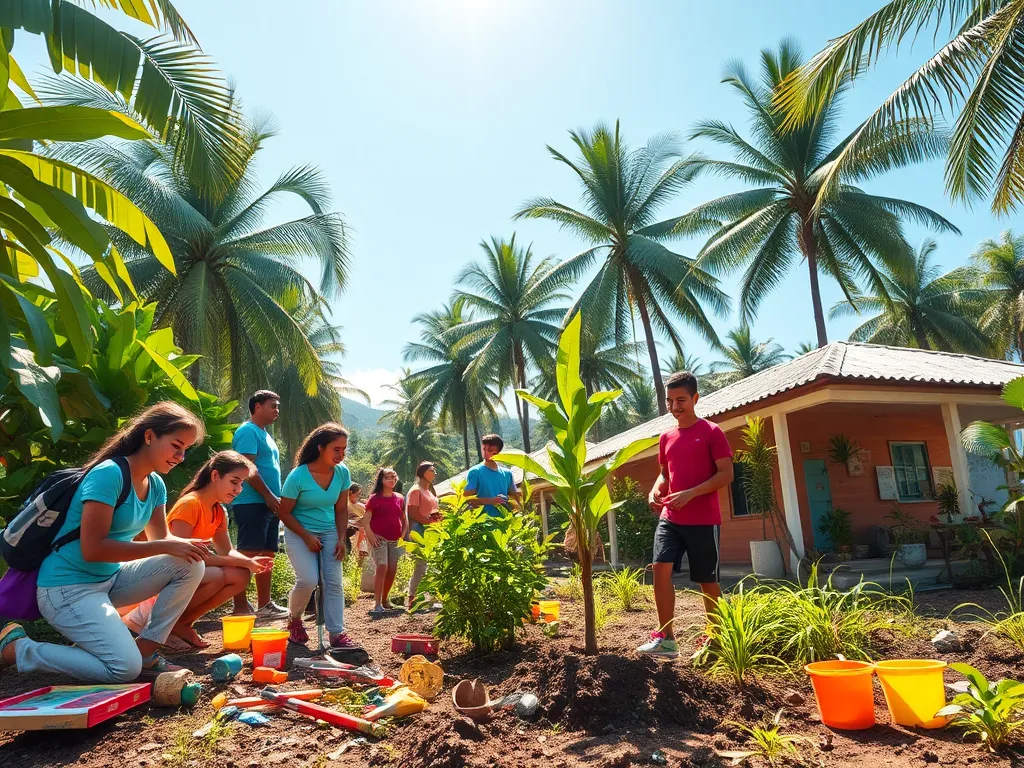Empowering Teens: Youth Volunteering Abroad Opportunities

Youth Volunteering Abroad: A Pathway to Global Citizenship
Youth Volunteering Abroad allows young individuals to engage in meaningful projects across the globe, contributing to communities while gaining invaluable experiences. This growing trend promotes social responsibility among youth, encouraging them to make a positive impact on a global scale. By immersing themselves in diverse cultures and environments, young volunteers not only assist local initiatives but also develop a profound understanding of the world around them.
Participating in Youth Volunteering Abroad can be transformative for both the volunteers and the communities they serve. Volunteers often find that they leave behind more than just their skills—they take away life lessons, newfound friendships, and a global perspective. Programs range from environmental conservation to teaching, each providing a unique opportunity for engagement and growth. This exchange fosters a sense of unity and shared purpose, which is crucial in today's interconnected world.
Moreover, Youth Volunteering Abroad is not just about giving; it is also about learning from the experiences of others. Volunteers arrive with their own skills and talents, but they leave with an enriched perspective, having adapted to various customs and traditions. Such experiences cultivate empathy and awareness of global issues, which are essential traits for future leaders. The memories and lessons learned during these volunteer experiences can shape a lifetime of activism and social engagement.
Despite the many advantages, embarking on a volunteering journey abroad requires thoughtful planning and consideration. It is essential for young volunteers and their guardians to research potential programs, assess the benefits and challenges, and prepare for the cultural shift they may encounter. However, the rewards of volunteering abroad often far outweigh the preparations needed, paving the way for profound personal and communal development.
Ultimately, Youth Volunteering Abroad provides a unique chance to step outside one's comfort zone, advocate for social change, and promote global understanding. As youth take part in these programs, they not only reshape their own futures but also contribute to a more compassionate and inclusive world.
Benefits of Youth Volunteering Abroad
One of the most significant benefits of Youth Volunteering Abroad is personal growth and skill development. Young volunteers are often faced with challenges that push them beyond their limitations, fostering independence and confidence. They develop problem-solving skills, adaptability, and resilience—qualities that are crucial in both personal and professional settings. Learning to work collaboratively in diverse teams also enhances their communication skills and cultural competency.
Cultural exchange and understanding are vital components of Youth Volunteering Abroad. Volunteers gain firsthand experience of different cultures, customs, and traditions, allowing them to see the world from a new perspective. This exposure fosters mutual respect and appreciation among different cultures, enhancing global interconnectedness and creating ambassadors for peace and understanding.
Building global networks through volunteering is another remarkable advantage. Young people who participate in these programs often form lasting friendships and professional connections with peers and organizations worldwide. These relationships can lead to collaborative projects, increased opportunities, and a strong sense of fellowship across borders.
How to Choose a Youth Volunteering Program
When selecting a Youth Volunteering program, it's crucial to consider several factors. Volunteers should evaluate the program's mission, the community's needs, and how well the program aligns with their personal interests and skills. It is also important to assess the program's duration, location, and the types of projects offered to ensure a good fit.
Finding reputable organizations for teens is essential to ensure a meaningful volunteering experience. Prospective volunteers should research organizations with positive reviews, strong track records, and transparent practices. Speaking with past volunteers can provide valuable insights, as can checking for accreditations or endorsements from recognized institutions in the volunteer sector.
Understanding program costs and commitments is another vital aspect. Volunteers should account for all expenses, including program fees, travel insurance, accommodation, and living costs. Many programs also have specific requirements regarding time commitments, which should align with the volunteer's schedule to facilitate a seamless experience.
Types of Volunteer Opportunities for Teens
Environmental conservation programs offer young people the chance to engage in projects that protect natural resources and biodiversity. Volunteers may work on reforestation efforts, wildlife rehabilitation, or environmental education initiatives, promoting sustainability and raising awareness about ecological issues in local communities.
Community development and teaching opportunities allow youth to contribute to educational and social initiatives directly. By volunteering as teachers or mentors, young volunteers help empower underprivileged children and youth, fostering learning and personal development. These programs often result in the creation of sustainable learning environments that benefit local populations.
Health care and support services volunteering provides youth with opportunities to work alongside healthcare professionals in various settings. Volunteers might assist in clinics, participate in health awareness campaigns, or support mental health initiatives, gaining insights into global health issues while making a difference in individuals' lives.
Preparing for Youth Volunteering Abroad
Essential preparations and research are crucial for a successful volunteering experience abroad. Prospective volunteers should familiarize themselves with the host country's culture, language, and social norms. Obtaining necessary vaccinations, understanding visa requirements, and establishing clear communication with the host organization are important preparatory steps that contribute to a smooth experience.
Packing tips and cultural sensitivity are also vital areas to consider. Volunteers should pack appropriately for the climate and activities they will engage in, as well as be mindful of the cultural context when choosing clothing and personal items. Demonstrating cultural sensitivity can help foster a positive relationship with the local community and enhance the overall experience.
Health and safety considerations while abroad cannot be overlooked. Volunteers should prioritize their well-being by staying informed about safety protocols, local laws, and health care facilities in the area. Engaging in health insurance plans and making contingency plans for emergencies will help ensure a safe and enjoyable volunteering experience.
Success Stories of Youth Volunteers
Inspirational stories from past participants illustrate the profound impact of Youth Volunteering Abroad. Many volunteers share accounts of transformative experiences, such as witnessing the resilience of communities in the face of adversity or forming lasting bonds with individuals they set out to help. These experiences often change their perspectives and ignite a passion for humanitarian work and social justice.
The impact on local communities and personal insights gained through volunteering are noteworthy. Youth volunteers often leave behind improved facilities, educational resources, and initiatives that benefit the community. Furthermore, their experiences imbue them with a deeper understanding of global issues and a commitment to effecting change in their own communities upon returning home.
Long-term benefits of volunteering abroad include career advantages, personal growth, and a lifelong dedication to serving others. Many volunteers credit their experiences abroad with shaping their academic pursuits, career choices, and community engagement. This journey often instills a lifelong passion for service, inspiring them to advocate for social change and become active global citizens.
